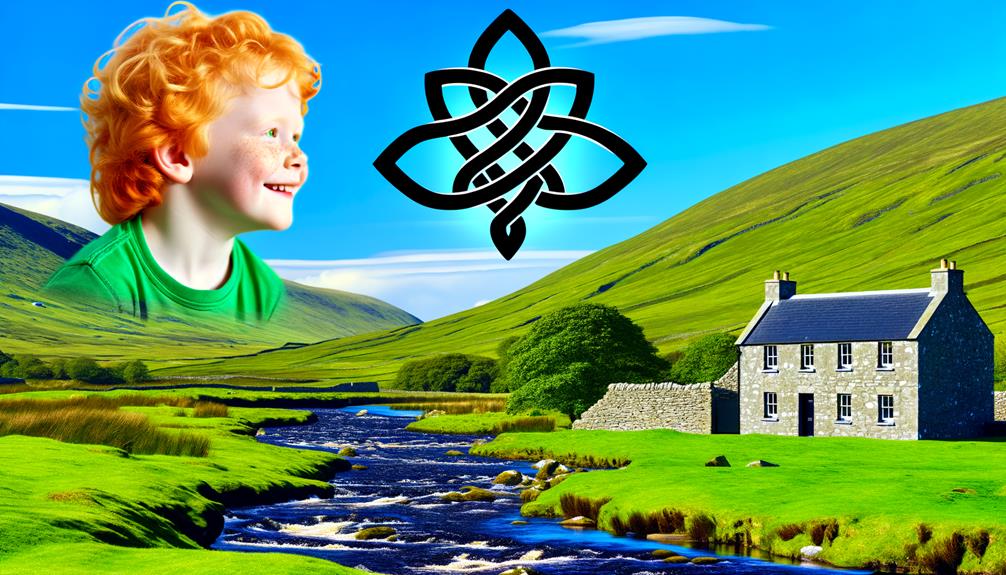Meaning of the Name Finnigan
The name Finnigan, originating from the Gaelic surname Ó Fionnagáin, translates to 'fair' or 'white.' This name highlights attributes valued in ancient Gaelic culture, where it symbolized nobility and purity. Historically, it evolved through anglicization, particularly during British rule, experiencing varying degrees of popularity.
Today, Finnigan is witnessing a resurgence in English-speaking countries, reflecting a broader appreciation of Gaelic heritage. The name also holds a notable presence in Irish literature and folklore.
For those intrigued by the rich tapestry of cultural and linguistic evolution associated with Finnigan, an exploration into its history promises deeper insights.

Key Takeaways
- Finnigan means "fair" or "white" in Gaelic, reflecting physical attributes.
- The name originates from the Gaelic surname Ó Fionnagáin.
- It symbolizes nobility, leadership, and purity in ancient Gaelic culture.
- Finnigan evolved through anglicization during British rule in Ireland.
- Modern usage shows a resurgence, valuing its deep cultural and historical significance.
Origins of Finnigan
The name Finnigan traces its origins to ancient Gaelic culture, specifically deriving from the Irish surname Ó Fionnagáin, which means 'descendant of Fionnagán.' This surname is rooted in the early medieval period when patronymic naming conventions were prevalent in Irish society.
The prefix 'Ó' indicates lineage, signifying a direct familial connection to an ancestor named Fionnagán, a diminutive form of the Old Irish name Fionn. Historical records suggest that the Finnigan family was associated with regions in County Galway and County Roscommon.
The name's evolution reflects broader socio-cultural shifts, including the anglicization of Irish names during British rule. Understanding Finnigan's origins provides critical insights into Gaelic naming traditions and their adaptation over centuries.
Etymology and Meaning
The name Finnigan originates from the Gaelic surname 'Ó Fionnagáin,' which itself derives from the personal name 'Fionnagán,' meaning 'fair' or 'white.'
In contemporary contexts, Finnigan is often interpreted to symbolize purity and clarity.
The cultural significance of the name is rooted in its historical association with nobility and leadership within Irish clans.
Gaelic Origins Explained
Tracing its roots back to the Gaelic language, the name Finnigan frequently evokes a sense of heritage and cultural significance. Linguistically, it derives from the Gaelic name 'Ó Fionnagáin,' which translates to 'descendant of Fionnagán.'
The prefix 'Ó' denotes lineage, while 'Fionnagán' itself is a diminutive of 'Fionn,' meaning 'fair' or 'white.' Historically, the name is associated with ancient Irish clans, reflecting a lineage tied to notable ancestors.
The phonetic structure of Finnigan accentuates its Gaelic origins, with the characteristic use of the 'Fionn' element, which has been a prevalent motif in Irish nomenclature. Such etymological details underscore the name's deep-rooted connection to Gaelic culture and its enduring legacy in genealogical contexts.
Common Interpretations Today
In contemporary contexts, the name Finnigan is often interpreted through its etymological roots, emphasizing qualities such as fairness and purity derived from its Gaelic origin 'Fionn.'
The term 'Fionn,' meaning 'fair' or 'white,' historically referenced physical appearance, but has evolved to symbolize moral and ethical purity.
Linguistically, 'Finnigan' is an Anglicized form of the Irish name 'Ó Fionnagáin,' signifying 'descendant of Fionnán.'
The diminutive suffix '-án' in 'Fionnán' conveys endearment, suggesting an affectionate or diminutive version of 'Fionn.'
Today, naming conventions often appreciate such etymological nuances, reflecting a modern-day penchant for names that carry historic depth and cultural resonance, while emphasizing virtues admired in contemporary society.
Cultural Significance Insight
How does the etymology of the name Finnigan reveal its profound cultural significance and historical depth?
The name Finnigan, rooted in the Gaelic 'Fionnagán,' is derived from the diminutive of 'fionn,' meaning 'fair' or 'white.' This etymological origin underscores the importance of physical attributes in ancient Celtic society, where such characteristics often signified nobility and other esteemed qualities.
The suffix '-agán' suggests endearment or familiarity, indicating a cherished individual. Historically, the name is linked to the ancient Irish Kingdom of Connacht, reflecting a lineage that intertwines with the region's socio-political fabric.
Linguistically, the preservation of Gaelic elements within the name Finnigan highlights the endurance of Irish cultural identity through centuries of linguistic evolution and external influences.
Historical Context
The name Finnigan, rooted in Gaelic tradition, can be traced back to ancient Ireland where it originally emerged from the surname Ó Fionnagáin, meaning 'descendant of Fionnagán.' Linguistically, 'Fionnagán' is a diminutive form of 'Fionn,' signifying 'fair' or 'white.' This name likely belonged to individuals of notable lineage or distinctive physical traits. The evolution of surnames in Ireland often reflected familial, geographic, or occupational identifiers, and Finnigan is no exception. The table below provides a concise linguistic breakdown:
| Term | Origin | Meaning |
|---|---|---|
| Finnigan | Gaelic | Descendant of Fionnagán |
| Fionnagán | Diminutive form | Little fair one |
| Fionn | Gaelic root | Fair, white |
| Ó | Prefix | Descendant of |
| Surname | Historical Role | Familial identity |
This historical context underscores the rich linguistic and cultural heritage embedded in the name Finnigan.
Popularity Over Time
To understand the name Finnigan's popularity over time, one must examine historical name trends, regional variances, and contemporary usage statistics. Historically, Finnigan has seen fluctuations in usage, often influenced by cultural and literary factors.
Regional popularity reveals a strong presence in Irish communities, while modern statistics show a resurgence in various English-speaking countries.
Historical Name Trends
Analyzing Finnigan's historical name trends reveals significant fluctuations in its popularity over different time periods. Originating from the Gaelic surname Ó Fionnagáin, Finnigan's usage as a first name saw periodic rises and declines, often influenced by cultural and societal shifts.
In the late 19th and early 20th centuries, the name gained moderate popularity, particularly among Irish immigrant communities. However, its prevalence diminished mid-century, coinciding with broader trends favoring shorter, more conventional names.
A resurgence in the late 20th and early 21st centuries can be attributed to a renewed interest in unique and heritage-rich names. Linguistically, Finnigan's rhythmic, melodic structure likely contributed to its periodic revivals, reflecting evolving preferences for names that convey both tradition and individuality.
Regional Name Popularity
Examining Finnigan's regional name popularity reveals distinct patterns that highlight cultural influences and migration trends across different geographic areas. Originating from Ireland, the name Finnigan is derived from the Gaelic Ó Fionnagáin, meaning 'descendant of Fionnagán.'
Its prevalence in regions with significant Irish diaspora, such as the United States, Canada, and Australia, underscores the migratory waves of the 19th and early 20th centuries. In Ireland, Finnigan remains a relatively common surname, reflecting its deep-rooted historical and cultural significance.
Conversely, in non-English-speaking countries, the name's popularity is minimal, likely due to linguistic barriers and cultural differences. This geographic dispersion illustrates the interplay between historical migration patterns and the enduring cultural legacy of Irish ancestry.
Modern Usage Statistics
Over recent decades, the name Finnigan has experienced fluctuating levels of popularity, influenced by broader cultural trends and the cyclical nature of name preferences. Historically rooted in Irish heritage, Finnigan saw a resurgence in the late 20th and early 21st centuries, paralleling a growing interest in unique, culturally enriched names.
Data from the Social Security Administration in the United States reveals that while Finnigan has never been among the top 100 names, its usage has progressively increased. This trend is partly attributed to the growing fascination with Irish names, bolstered by media portrayals and celebrity choices. It reflects a broader linguistic shift towards names that convey distinctiveness and cultural depth, marking Finnigan as a name of enduring, albeit niche, appeal.
Cultural Significance
Often associated with Irish heritage, the name Finnigan carries deep cultural significance that reflects the rich history and linguistic traditions of Ireland. The name, derived from the Gaelic Ó Fionnagáin, is steeped in cultural narratives and historical contexts.
- Historical Roots: The name traces back to ancient Gaelic clans, signifying lineage and familial ties.
- Linguistic Elements: Comprising 'fionn,' meaning fair or white, and the diminutive suffix '-án,' it reflects descriptive naming conventions.
- Cultural Representation: The name appears in Irish folklore and literature, symbolizing heroism and adventure.
- Diaspora Influence: Irish emigrants brought the name to various parts of the world, embedding it in global cultural milieus.
Analyzing these facets reveals the profound cultural resonance of the name Finnigan.
Famous Finnigans
The name Finnigan has been borne by numerous notable individuals across various fields, illustrating its widespread cultural and historical impact.
One prominent figure is James Finnigan, a pioneering photographer known for his evocative landscapes and contributions to visual storytelling in the early 20th century.
In literature, Finnigan's Wake by James Joyce immortalizes the name, embedding it in a complex tapestry of linguistic innovation.
The name also appears in contemporary popular culture, such as in the character Seamus Finnigan from the Harry Potter series, showcasing its enduring appeal.
Additionally, academic circles have witnessed influential Finnigans, like Dr. Sarah Finnigan, whose research in environmental science has garnered international recognition.
These examples underscore the name's versatility and significant presence across diverse domains.
Variations and Nicknames
Throughout its history, the name Finnigan has evolved into various forms and nicknames, reflecting linguistic, cultural, and regional influences. This evolution showcases the adaptability and widespread appeal of the name.
Several notable variations and nicknames have emerged:
- Finnegan: A common alternate spelling, often seen in Ireland and the United States.
- Finn: A popular diminutive, highlighting the name's versatility and ease of use.
- Fingal: A Gaelic variation that emphasizes the name's deep-rooted Celtic origins.
- Fitz: A less common, yet historically significant nickname derived from the Old Norman 'Fitz,' meaning 'son of.'
These variations illustrate the rich tapestry of linguistic evolution and cultural adaptation that the name Finnigan has undergone over centuries.
Modern Usage
In contemporary contexts, the name Finnigan is experiencing a resurgence, reflecting broader trends in the revival of traditional and culturally rich names. This revival is part of a larger societal movement that values heritage and linguistic diversity.
Historically, Finnigan has Irish roots, derived from the Gaelic Ó Fionnagáin, meaning 'descendant of Fionnagán,' a diminutive of 'fair' or 'white.' Linguistically, its phonetic appeal and rhythmic cadence make it attractive to modern parents seeking unique yet meaningful names.
Additionally, popular culture, including literature and media, has contributed to its renewed popularity. Overall, the name Finnigan embodies a blend of historical significance and contemporary appeal, making it a preferred choice for those looking to honor their cultural legacy while embracing modern naming conventions.
Conclusion
The name Finnigan, rooted in Irish heritage and etymologically derived from 'Fionn' meaning 'fair' or 'white,' encapsulates a rich historical and cultural tapestry.
Though some may argue its relative obscurity in contemporary usage, Finnigan's periodic resurgence in popularity underscores a timeless appeal.
The name's cultural and historical significance, bolstered by notable bearers, secures its enduring relevance.
As a result, Finnigan remains a compelling choice, resonating with linguistic depth and historical continuity.






